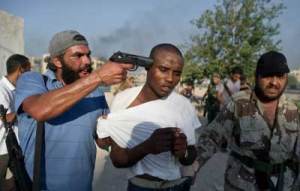Absolute Lawlessness: Libyan “Democracy” Two Years After NATO Air War

Mass protests are sweeping across Libya as the country marks the second anniversary of the beginning of a civil war that ousted Muammar Gaddafi. Two years after the fall of the Gaddafi regime, no new constitution has been drafted.
The new authorities have obviously failed to maintain law and order. Crime is rampaging and popular discontent is on the rise. Prime Minister Ali Zeidan has shut the borders with neighboring Egypt and Tunisia from February 14 to 18 as a security precaution.
Though the anti-Gaddafi revolt erupted on February 17, the main celebrations will take place on the 15th . Airport security is being tightened. Meanwhile, Lufthansa and Austrian Airlines have suspended all flights to Libya until the 17th, citing “tensions on the grounds”. Earlier, Germany, France, Canada and other countries urged their citizens to immediately leave Benghazi over the imminent threat of terrorist attacks. Security is being tightened in the capital Tripoli and also in Benghazi where four U.S. diplomats were killed in a bloody raid on the U.S. consulate last September.
With anarchy and marauding flourishing in border areas where once strict law and order reigned under Gaddafi, most Libyans, particularly in the east, have been outraged by the authorities’ inaction. In addition to local extremists and “adventure seekers”, terrorists of all sorts, including groups of jihadists from Mali, have been pouring in. The “democracy” the West had once been so fervent in forcing upon Libya looks more like a medieval rule, says Director of the Cairo-based Java Center for Political Studies Rifaat Sayed Ahmad.
“NATO air strikes threw the once prospering country by African standards back into the Middle Ages, and still worse, they plunged it into a civil war. The West used military force to install an obedient yet unpopular regime unable to deal with the religious and tribal feud that is tearing the country apart. Libyan oil and gas – that was the main target of NATO’s military intervention in the name of the noble goal of freeing ordinary Libyans from Colonel Gaddafi’s dictatorship, as one French TV program put it.”
The unhappy outcome is hardly a surprise and had been foreseen by analysts even before the intervention began, says Russian political scientist Stanislav Tarasov.
“Not just Russian analysts but Western ones as well made such forecasts. Libya is fragmented and may, in prospect, split into two or even three states. Some territories ruled by certain tribal clans have set up their own borders. In this situation, attempts by the so-called central government to adopt an all-Libyan law, a constitution accepted by all, appear to be doomed. The West which initiated the “Arab spring” in Libya can offer nothing except the use of force.”
No immediate improvements should be expected though. Boris Dolgov, a senior researcher at the Center for Arabic Studies in Moscow, notes that Libya is a long way from stabilization. It is actually the hotbed of instability for the entire North Africa.
“We are witnessing a spread of radical Islamism, as in the case of Mali and Algeria. The events in Mali and Libya are closely intertwined. Gaddafi waged a war on radical extremism and kept the situation under control. More than 600 Islamists were in jails. After the fall of Gaddafi, they walked free and joined radical groups, including those operating in Mali.”
Libya today is “a territory of absolute lawlessness”, as some Arab analysts call it, or rather it’s a powder keg to which a blazing torch has already been brought.

